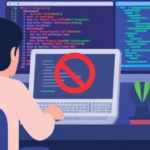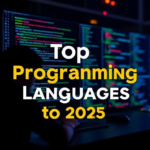The world of programming is constantly evolving, with new trends and technologies emerging every year. As a developer, staying up-to-date with the latest advancements is crucial for maintaining a competitive edge and ensuring your skills are relevant in the ever-changing tech landscape. In this article, we’ll explore some of the most exciting and impactful trends shaping the future of programming.
1. Artificial Intelligence and Machine Learning Integration
Artificial Intelligence (AI) and Machine Learning (ML) have already begun transforming the way we approach programming. As these technologies continue to advance, developers are increasingly incorporating AI and ML into their applications to enhance functionality and automate tasks.
For example, AI-powered tools can help programmers write more efficient code, debug errors, and even suggest optimizations. Moreover, Machine Learning algorithms can be applied to a variety of domains, including predictive analytics, autonomous vehicles, healthcare diagnostics, and more.
As a developer, learning how to work with AI and ML frameworks (like TensorFlow, PyTorch, and Scikit-Learn) will give you a major advantage and open up new career opportunities in these rapidly growing fields.
2. Low-Code and No-Code Development
Low-code and no-code development platforms are gaining significant traction in the software development world. These platforms allow developers (and even non-developers) to create applications with little to no programming knowledge. With a visual interface and drag-and-drop features, these tools make building complex applications more accessible than ever.
While low-code/no-code platforms won’t replace professional developers, they will empower businesses to create solutions more quickly and efficiently. Developers who are familiar with these platforms can help guide teams in building scalable, secure, and maintainable applications without starting from scratch.
As low-code and no-code development continue to evolve, developers will need to learn how to leverage these platforms to create more powerful, custom solutions in less time.
3. Quantum Computing
Quantum computing is still in its early stages, but it promises to revolutionize how we solve complex problems that are currently beyond the capabilities of classical computers. While it may not yet be a mainstream tool, quantum computing holds the potential to address issues in cryptography, drug development, climate modeling, and more.
For developers, learning about quantum computing and the quantum programming languages (such as Q# and Python-based Quantum Development Kit) will be a valuable skill for future-proofing their careers. Although quantum computing is not something that will replace traditional development in the immediate future, being familiar with it could give you a unique edge in the years to come.
4. Blockchain and Decentralized Applications (DApps)
Blockchain technology is not just limited to cryptocurrencies like Bitcoin and Ethereum. Developers are increasingly building decentralized applications (DApps) on blockchain platforms that provide transparency, security, and immutability.
In addition to finance, blockchain technology is being used in areas such as supply chain management, voting systems, and healthcare. As blockchain continues to disrupt various industries, developers with expertise in blockchain programming languages (such as Solidity for Ethereum smart contracts) will be in high demand.
Mastering blockchain development could give you a foothold in one of the most exciting areas of tech innovation today.
5. Cloud-Native Development and Microservices
The rise of cloud computing has led to the widespread adoption of cloud-native development practices. In cloud-native development, applications are built and deployed in cloud environments using microservices, which are small, independent components that work together to form a complete system.
Microservices allow for better scalability, flexibility, and maintainability. As more businesses move to the cloud and embrace containerization technologies like Docker and Kubernetes, developers will need to become proficient in building and deploying microservices-based applications.
Additionally, learning cloud platforms like AWS, Azure, and Google Cloud will be essential for developers looking to build scalable, high-performance applications in the cloud.
6. DevOps and Automation
DevOps is a set of practices aimed at automating and improving the development, testing, and deployment process. The goal of DevOps is to shorten development cycles, improve product quality, and deliver updates more frequently.
Automation tools, like Jenkins and GitLab, are essential in the DevOps lifecycle for continuous integration and continuous deployment (CI/CD). Developers who are familiar with DevOps principles and automation tools will be better equipped to work in agile environments and support efficient software delivery pipelines.
7. Edge Computing
Edge computing is the practice of processing data closer to where it is generated (at the “edge” of the network) rather than relying on a centralized cloud infrastructure. This reduces latency, enhances real-time processing capabilities, and helps optimize bandwidth usage.
With the growth of Internet of Things (IoT) devices and the need for real-time data analysis, edge computing will become more important. Developers will need to learn how to build applications that can operate efficiently in edge environments, taking advantage of low-latency processing and real-time data collection.
Conclusion
The future of programming is both exciting and challenging, with emerging technologies like AI, quantum computing, blockchain, and cloud-native development changing the landscape of software development. To stay relevant in this ever-evolving field, developers must continuously adapt and learn new skills. By staying up-to-date with these trends and embracing the latest technologies, you can ensure that your career remains on the cutting edge of the programming world.




